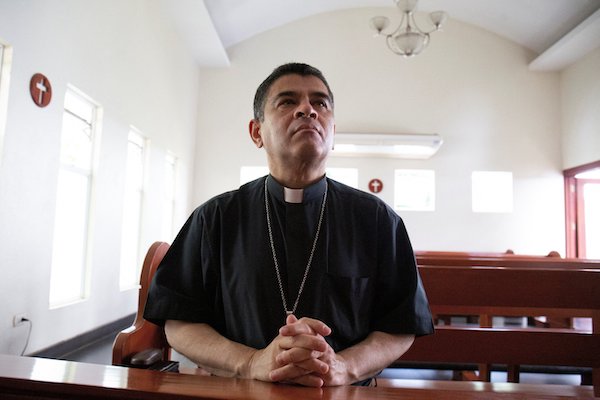
By David Agren
(OSV News) — Bishop Rolando Álvarez of Matagalpa was convicted and sentenced by a Nicaraguan court to 26 years in prison Feb. 10 — barely a day after the outspoken prelate defied President Daniel Ortega by refusing to go into exile.
The court convicted Bishop Álvarez on charges of conspiracy to undermine national integrity and spreading false information after a secret trial in which he was denied a lawyer of his choosing. He was also stripped of his Nicaraguan citizenship and prohibited from holding elected office or a public position.
Bishop Álvarez was not present as Judge Octavio Rothschuh delivered the decision Feb. 10 over state-controlled media.
Ortega disparaged Bishop Álvarez the previous day as “deranged” and accused him of being “someone who considers himself leader of the church in Nicaragua, the church in Latin America.”
Bishop Álvarez refused to board a Feb. 9 flight carrying more than 200 political prisoners to the United States, according to Ortega, who says the prelate wanted to meet first with his fellow bishops. Bishop Álvarez was subsequently moved from house arrest — where he had languished incommunicado for five months — to a prison notorious for deplorable conditions.
“Irrational and uncontrollable hatred from the Nicaraguan dictatorship toward Bishop Rolando Alvarez. Merciless vengeance against him. They have not withstood his moral stature and his prophetic coherence,” tweeted Auxiliary Bishop Silvio José Baez of Managua, who has been exiled in Miami.
“Rolando will be free. God will not abandon him,” he tweeted. “They sink further each day in their fear and evil,” he wrote about the regime.
Bishop Álvarez’s conviction follows the Ortega regime sending 222 political prisoners to the United States, including six clergymen also convicted of conspiracy and spreading false information.
The sentence given to Bishop Álvarez was the harshest for an Ortega opponent since the Nicaraguan leader unleashed a crackdown on critics of his increasingly tyrannical regime, according to The Wall Street Journal.
Ortega has persecuted political opponents — arresting seven potential presidential candidates prior to his winning re-election in 2021, in a race the United States and European countries considered rigged. His regime has also extinguished the registrations of non-governmental groups, forced the closure of church charities and educational projects, and suppressed independent media outlets.
The Nicaraguan church has a complicated history with Ortega, who first claimed power in a 1979 revolution with the Sandinistas and returned to office in 2007, presenting himself as a proper Catholic — and supported by some in the church hierarchy.
Church leaders clashed with Ortega and his wife, Vice President Rosario Murillo, after protests over a proposed social security reform erupted in 2018. Parishes provided shelter for protesters and priests subsequently accompanied the families of political protesters.
“The church has been a moral voice in supporting the defense of life and dignity,” a Nicaraguan priest, who wants to remain anonymous, told OSV News prior to Álvarez’’s sentencing. “It opted for being a home or field hospital, as the pope says.”
“Bishop Álvarez,” the priest said, “is the most beloved and most respected bishop for his coherence and his commitment to the poor and neediest. He has been a clear and firm voice in defense of human dignity and, in his role as a pastor, he has been a prophetic voice in defense of the most vulnerable.”
